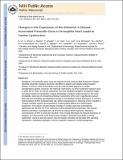Changes in the expression of the Alzheimer's disease-associated presenilin gene in drosophila heart leads to cardiac dysfunction
Author(s)
Li, A.; Zhou, C.; Moore, J.; Zhang, P.; Tsai, Tsung-Han; Lee, Hsiang-Chieh; Romano, D. M.; McKee, M. L.; Schoenfeld, D. A.; Serra, M. J.; Raygor, K.; Cantiello, H. F.; Fujimoto, James G.; Tanzi, R. E.; ... Show more Show less
DownloadFujimoto-Changes in the expression.pdf (2.631Mb)
OPEN_ACCESS_POLICY
Open Access Policy
Creative Commons Attribution-Noncommercial-Share Alike
Terms of use
Metadata
Show full item recordAbstract
Mutations in the presenilin genes cause the majority of early-onset familial Alzheimer’s disease.
Recently, presenilin mutations have been identified in patients with dilated cardiomyopathy
(DCM), a common cause of heart failure and the most prevalent diagnosis in cardiac
transplantation patients. However, the molecular mechanisms, by which presenilin mutations lead
to either AD or DCM, are not yet understood. We have employed transgenic Drosophila models
and optical coherence tomography imaging technology to analyze cardiac function in live adult
Drosophila. Silencing of Drosophila ortholog of presenilins (dPsn) led to significantly reduced
heart rate and remarkably age-dependent increase in end-diastolic vertical dimensions. In contrast,
overexpression of dPsn increased heart rate. Either overexpression or silencing of dPsn resulted in
irregular heartbeat rhythms accompanied by cardiomyofibril defects and mitochondrial
impairment. The calcium channel receptor activities in cardiac cells were quantitatively
determined via real-time RT-PCR. Silencing of dPsn elevated dIP[subscript 3]R expression, and reduced dSERCA expression; overexprerssion of dPsn led to reduced dRyR expression. Moreover,
overexpression of dPsn in wing disc resulted in loss of wing phenotype and reduced expression of
wingless. Our data provide novel evidence that changes in presenilin level leads to cardiac
dysfunction, owing to aberrant calcium channel receptor activities and disrupted Wnt signaling
transduction, indicating a pathogenic role for presenilin mutations in DCM pathogenesis.
Date issued
2011-05Department
Massachusetts Institute of Technology. Department of Electrical Engineering and Computer ScienceJournal
Current Alzheimer Research
Publisher
Bentham Science Publishers
Citation
Li, A. et al. “Changes in the Expression of the Alzheimer’s Disease-Associated Presenilin Gene in Drosophila Heart Leads to Cardiac Dysfunction.” Current Alzheimer Research 8.3 (2011): 313–322. Web.
Version: Author's final manuscript
ISSN
1567-2050